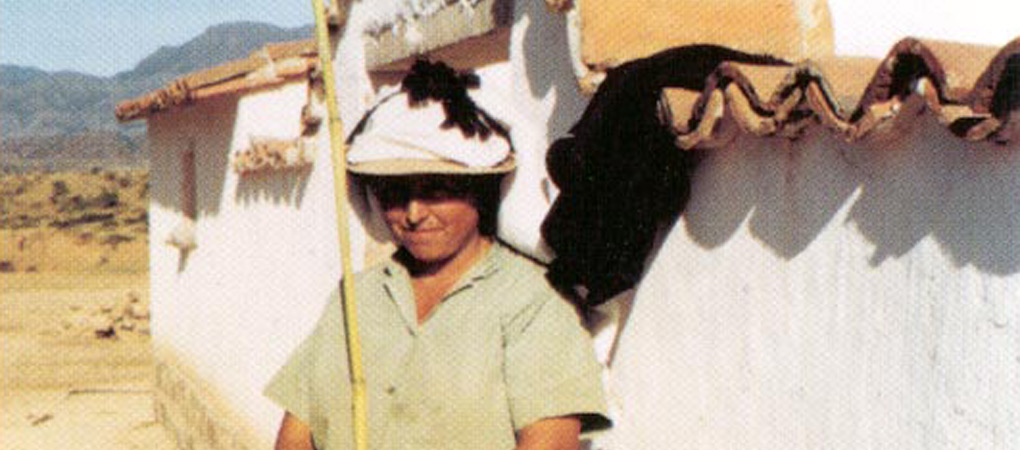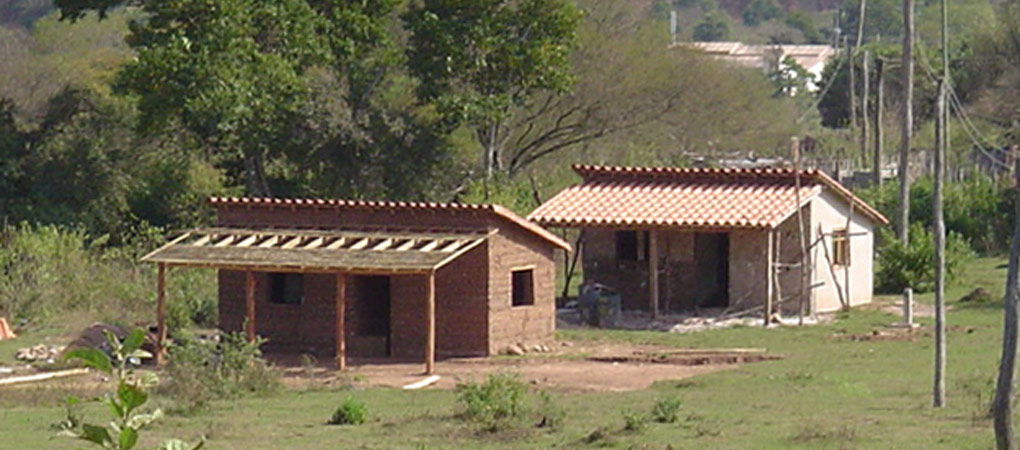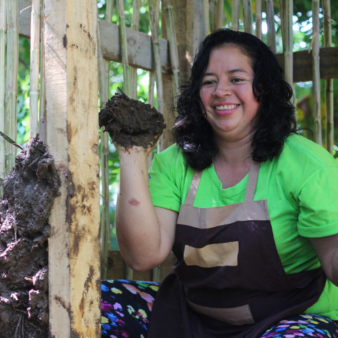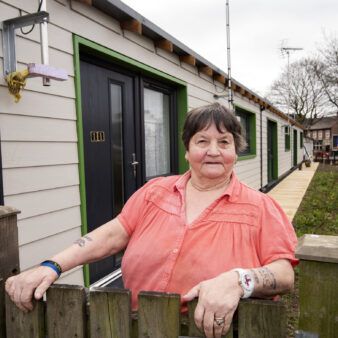The programme seeks to control Chagas, a parasitic illness affecting the rural poor in the high Andes of Latin America, through education, training and physical housing improvements. Since 1986, over 3,600 houses have been improved in 28 communities, helping over 12,650 people. The parasite inhabits thatch roofs and un-rendered adobe or mud-brick walls of poor homes. 25 per cent of the population are already affected and the disease is now spreading to the urban areas. The Chagas 2000 Project is the continuation of a successful pilot programme run by Fundación Pro Hábitat, which is easily transferable throughout Latin America. The programme’s approach is being taken up by the government to improve a further 90,000 homes in rural areas.
Project Description
Bolivia is situated in the centre of South America with the Andean Mountains running through the western half of the country. It has a population of 8 million people and is the least developed of the South American countries. In much of the country, subsistence agriculture is the main occupation. Chagas is a fatal parasitic illness prevalent in much of Latin America where more than 20 million people are affected by it. In Bolivia, it is estimated that over 70 per cent of the country is endemic. 10 per cent of those contracting the disease develop the chronic stage in their mid 30s and 40s and die suddenly due to a heart attack or digestive failure. There is no cure for this chronic stage of the illness and destitution frequently results from the death of the family’s income earner.

The Chagas 2000 Programme was initiated in 1996 by a Bolivian non-governmental organisation, Fundación Pro Habitat (FPH) implementing over 10 years of experience using community particpation in human settlements development and four years working specifically in the field of Chagas control. The project is part of a continuing programme, the primary aim of which is to improve the health and housing of the rural population through control of the vector of Chagas disease. To date is has reached over 4,000 families in 45 rural communities in the Tarija region in the South of Bolivia and the Bolivian government is planning to extend this FPH approach to 90,000 households nation-wide.
Chagas is known as ‘the illness of the poor’ since it is spread by the “vinchuca” beetle (Triatoma Infestants) also known as the “kissing” beetle which infests the thatch roofs and mud brick (adobe) walls of the homes of poor people. Whilst previously Chagas had been a problem primarily of the rural areas, it is increasingly spreading to the urban fringes as rural dwellers migrate to the city taking their animals with them. People in the past had a somewhat fatalistic attitude towards Chagas and accepted it as part of their lives and there was little understanding of the link between the presence of vinchucas and death from Chagas.
Due to the absence of vaccines or effective medication in the chronic phase of the illness, Chagas has to be controlled by preventative methods taken to eliminate the spread of the parasite which causes the disease. The parasite is carried by the vinchuca beetle which looks like a small cockroach. It does not like light and lives in dark nooks and crannies and animal corals and flies into houses at night. It will not remain in a house if there are no places for it to breed.
Pro Habitat’s Chagas 2000 Programme seeks to carry out simple modifications and improvements to make rural houses vinchuca proof. These physical improvements are part of an integrated programme which also includes educational on the causes of Chagas disease and training in vigilance methods. The physical improvements to the houses include:
- rendering the house both inside and outside to eliminate the cracks and crevasses in which the vinchuca likes to live;
- replacing the mud and straw roofs with roofs made of local clay tiles;
- either plastering the ceiling or stretching fabric across the roof void to prevent vinchucas falling onto sleeping people below;
- making rooms lighter and brighter by putting in windows and painting the house white, both inside and outside;
- moving animal corrals away from the immediate environs of the house and rendering and capping the corral walls;
- rendering the traditional outdoor ovens, a favourite haunt of the vinchuca and introducing new forms of indoor ovens built of rendered adobe with chimneys or canopies;
- showing families how they can re-organise their living space so as to eliminate dark places that the vinchucas favour, e.g. providing shelving for storage and the hanging of clothes and cooking utensils away from the walls.
The improvement works to the houses are carried out by the people themselves after training in the techniques required. Local materials and low cost technologies are used which ensure that the programme is sustainable in the long term and the practices introduced will not be abandoned when the project finishes. Training in the use of these low cost technologies is an important part of the methodology and workshops are held in each community using a local building as a model to demonstrate and practice the whole improvement process.
Involvement of the local community has been crucial to the success of Fundación Pro Habitat’s work. In each community a meeting is held with local residents to explain the project and to select volunteer promoters who will act as intermediaries between Pro Habitat and the local families. Before works begin a committee is formed to take responsibility for the project in the locality. A baseline survey is carried out prior to work beginning to identify house condition and levels of infestation. It is important that all houses in a community are improved so that the vinchuca beetle cannot live and breed in some houses and fly into adjacent houses at night.
Educational sessions are held in the local schools and health posts to explain about Chagas and how it can be prevented. In addition a system of vigilance and supervision has been developed which includes the establishment of Vinchuca Information Posts in local schools and health posts where information on re-infestation of properties is gathered so that further preventative action can be taken. Educational fairs are held with songs and plays acted out by the children and adults to reinforce the Chagas control message. High quality and appropriate educational materials have been produced by Fundación Pro Habitat and these can be widely seen in daily use. Women are encouraged to participate actively, both in meetings and educational sessions as well as in the physical improvement work. They attend training workshops on construction, budgeting and supervision of works. Community members are encouraged to help those families who are unable to help themselves, i.e. elderly women living alone or single mothers.
The project costs of Chagas 2000 were met by a combination of subsidy, provided by Pro Habitat and Plan International (a UK based donor agency) and destined towards technical assistance, education and the purchase of non local construction materials, and self-help from the participating families, who provide some of the materials and the labour. The project successor, PROPPLAN II, a wider programme extending to rural communities in the Departments of Chuquisaca and Cochabamba, as well as to further provinces of Tarija, includes additional funding from the Ministry of Housing and Basic Services for part of the cost of the physical housing improvements.
On average, the cost of physical improvements to a house is £537 ($US 860) of which £95 ($US153) or 18 per cent is the institutional contribution and £442 ($US 707) is met by the participating family, in the form of local construction materials and manual labour. The training and education programme requires substantial subsidy for the preparation and distribution of a wide range of publicity materials and the organising and staffing of training workshops and meetings. In addition, Pro Habitat runs a micro-credit programme which enables families to take out loans to further extend and improve their homes. These credits are also available to families living in peri-urban neighbourhoods which show an increasing level of vinchuca infestation.
Since the introduction of the programme there has been a significant reduction in the number of people contracting the Chagas illness and the government has selected this effective and affordable approach to be used for the control of Chagas throughout Bolivia.
Partnership
NGO, local communities



